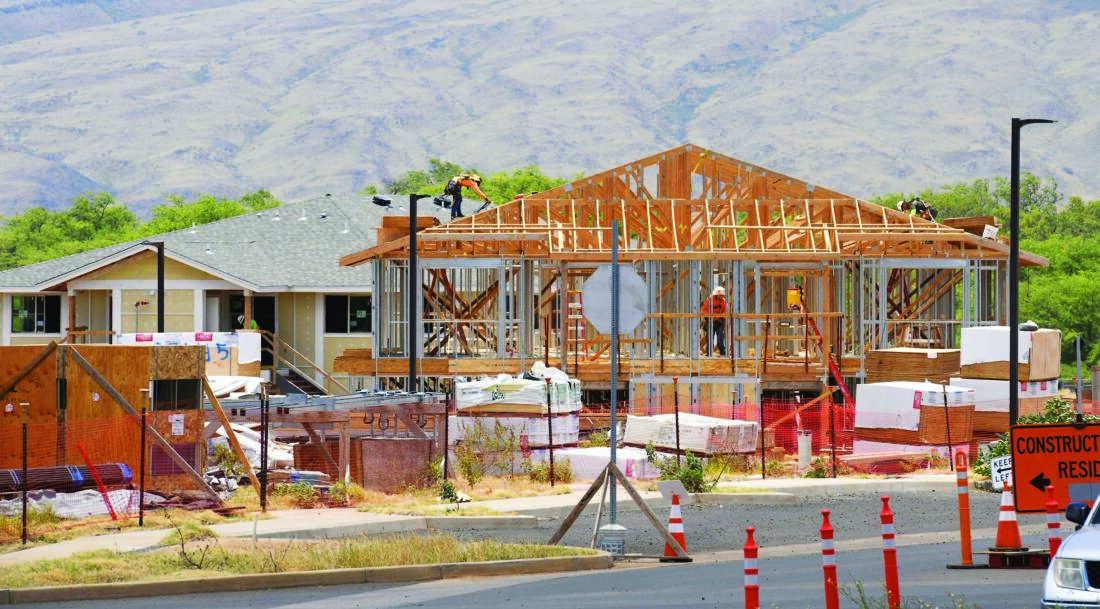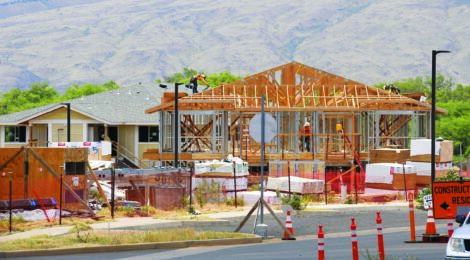Tax could fund projects, but some worry about cost
Maui could become final county to add surcharge under new law

The Kamalani housing development is seen under construction in June 2018. Maui County is proposing to add a surcharge to the state’s general excise tax to generate funds to pay for housing infrastructure and other public projects like water and sewer systems. But some worry the additional costs on goods and services will impact residents already burdened by high inflation. The county is currently the only one in the state that does not impose the surcharge. — The Maui News / MATTHEW THAYER photo
Maui County could have seen around $283 million in added income if it had followed other counties four years ago in adding its own surcharge to the state’s general excise tax, according to tax officials’ estimates.
But in 2019, the county opted not to impose a surcharge of up to 0.5 percent on top of the state’s 4 percent general excise tax, making it the only one in the state not to do so. And the window to add on the surcharge — which could fund housing infrastructure, sewer and water systems — closed.
But last week, Gov. Josh Green signed a bill into law that reopens that possibility.
That’s why Maui County Council members are now considering a bill that would add the surcharge, which would affect the cost of goods and services ranging from groceries to hair cuts to medical services throughout Maui County. And while some welcome the additional funding, others are concerned about the burden on residents.
Kihei resident Tom Croly said the tax “affects everybody.”
“A half percent may not sound like much, but the big issue today is inflation. And let’s be clear — a half percent additional GET is an immediate half percent inflation on everything that everyone buys,” Croly said Friday in public testimony to the council’s Budget, Finance and Economic Development Committee, which is considering the bill.
Croly said he supports building infrastructure for affordable housing, “but I don’t think this method is the right way to go about it.”
“I think it will at least initially for 10 years or more hurt the people that it is trying to help,” he said, noting that the infrastructure is not going to be realized for a “good long period.”
Croly was among a handful of people who testified before the committee and in writing, with the majority against adding the surcharge.
Physical therapist Eric Rohozinski said that the state’s overall GET, which medical providers already have to pay, is keeping doctors from settling and staying in the state and is already a burden at its current level.
“For the last 33 years I’ve been practicing, I have to pay GET tax, but my colleagues in the Mainland don’t pay that,” he said.
He said he has seen opportunities for local medical professionals to stay, but they don’t because of the taxes.
“This tax may be enough to break some of us in private practice,” he said.
Tom Blackburn-Rodriguez called the measure “a creative way to assign funds to the purposes of the tax allocation and the one-half percent increase.” But he said some may feel the method is an added cost to their living.
He suggested that the council could “add potentially fiscally responsible conditions” to the bill, such as requiring that projects use environmentally sound building practices and the latest concrete production techniques to help cut down on construction costs when possible.
Some testifiers referred to the surcharge as a regressive tax, and Council Member Tamara Paltin cautioned that the tax could hurt some families more than others, especially those with more children.
“If you have 10 kids and you got to feed and clothe all 10 kids, it’s going to hit you harder than someone with no kids,” she said. “I know a lot of it will be passed on to the tourists as well as small businesses just coming out of COVID and what not.”
She said while there are “safety nets” the federal and state government can deploy to help those in need, such as the Supplemental Nutrition Assistance Program for food stamps, and while the state can issue rebates, the county doesn’t have a program that could help those affected if a surcharge is enacted.
“We can certainly look into that,” said Laksmi Abraham, executive assistant and legislative liaison to the mayor.
County Finance Director Scott Teruya shared with the committee a report he obtained from the state Department of Taxation which shows that the county could see upwards of $70 million per fiscal year if the surcharge is enacted.
If Maui County had enacted the surcharge when other counties did, it could have seen $71.4 million in revenues from the surcharge in fiscal year 2019, $69.8 million in fiscal 2020 when the pandemic began, $62.1 million in fiscal 2021 and $80 million in fiscal 2022.
Teruya anticipated that if the surcharge began Jan. 1, the county could see around $40 million generated in the last part of fiscal 2024.
He said that while some may call the surcharge a “regressive tax,” a lot of revenue is going to come from the visitors coming to Maui County.
If enacted, the surcharge could also fund waste disposal along with sidewalks and pedestrian paths.
Committee members took no action Friday, as committee Chairwoman Yuki Lei Sugimura deferred the bill and scheduled it for discussion again on June 20, during which amendments will be proposed.
She is also seeking to hold a nighttime public hearing on the bill so more residents can offer input.
Sugimura is seeking to get the bill passed by the full council in July, as there is an Aug. 1 deadline so that the charge can begin on Jan. 1.
* Staff Writer Melissa Tanji can be reached at mtanji@mauinews.com.
- The Kamalani housing development is seen under construction in June 2018. Maui County is proposing to add a surcharge to the state’s general excise tax to generate funds to pay for housing infrastructure and other public projects like water and sewer systems. But some worry the additional costs on goods and services will impact residents already burdened by high inflation. The county is currently the only one in the state that does not impose the surcharge. — The Maui News / MATTHEW THAYER photo





